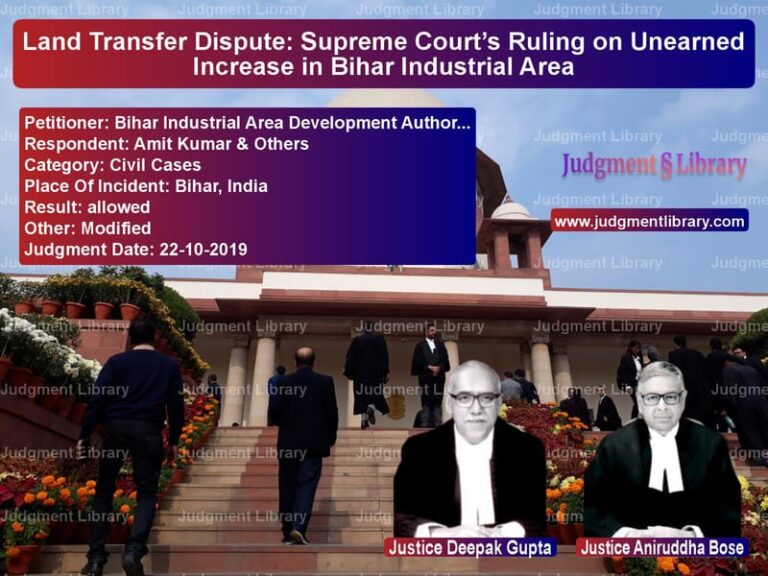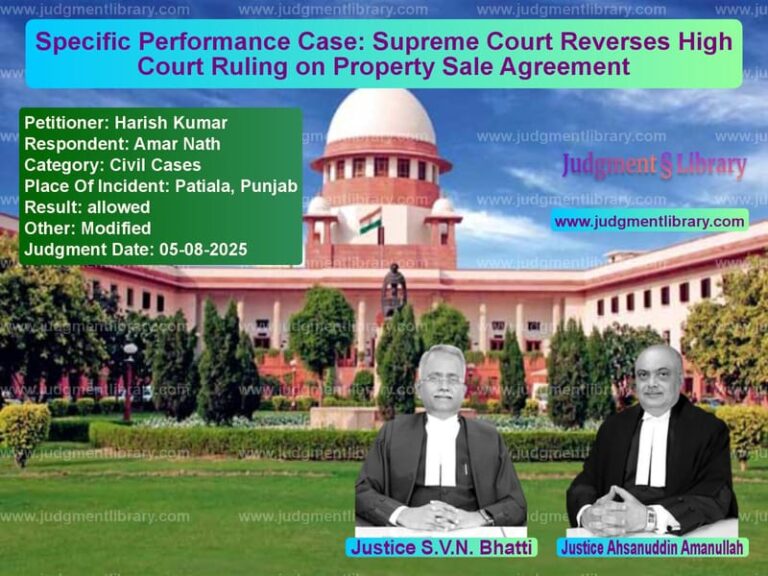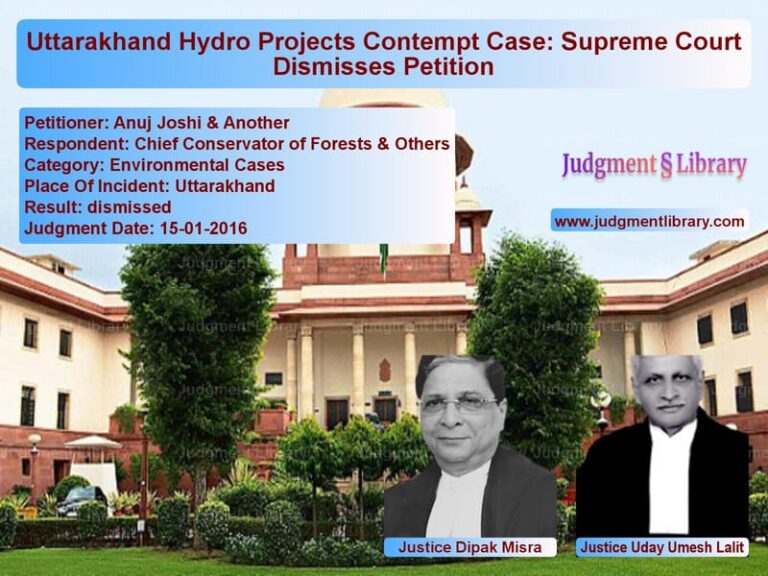Supreme Court Upholds Land Acquisition: Clarifying Section 24(2) of the Land Act
The Supreme Court of India, in the landmark case of Land and Building Department & Anr. vs. Manish Sethi & Ors., reaffirmed the principles governing land acquisition under Section 24(2) of the Right to Fair Compensation and Transparency in Land Acquisition, Rehabilitation and Resettlement Act, 2013. The judgment set aside the Delhi High Court’s ruling, which had declared the land acquisition process lapsed due to the non-payment of compensation. This decision provides much-needed clarity on the interpretation of Section 24(2) and its applicability.
Background of the Case
The case emerged from the acquisition of land in Delhi by the Land and Building Department for a public infrastructure project. The acquisition was initiated under the Land Acquisition Act, 1894, and possession of the land was taken by the government. However, the landowners, Manish Sethi & Ors., filed a writ petition in the Delhi High Court, contending that since compensation had not been paid, the acquisition had lapsed under the provisions of the 2013 Act.
The Delhi High Court ruled in favor of the landowners, holding that the acquisition was nullified under Section 24(2) of the 2013 Act. Aggrieved by the decision, the Land and Building Department appealed to the Supreme Court.
Key Legal Issues
The Supreme Court had to address three primary legal questions:
- Whether land acquisition lapses under Section 24(2) if compensation has not been paid, even when possession has been taken.
- Whether the Delhi High Court misapplied the precedent set in previous cases.
- Whether the deposit of compensation in the government treasury fulfills the statutory requirement.
Arguments by the Appellants (Land and Building Department)
The government, represented by senior legal counsel, argued:
“The High Court’s ruling is erroneous as it failed to consider that possession had already been taken. Mere non-payment of compensation does not invalidate the acquisition.”
Key points raised:
- The land was acquired in 2007, and possession was taken on March 28, 2007.
- The Supreme Court’s Indore Development Authority vs. Manoharlal (2020) ruling clarified that an acquisition does not lapse if possession has been taken.
- The Delhi High Court incorrectly applied Pune Municipal Corporation vs. Harakchand Misirimal Solanki (2014), which had been overruled.
- The deposit of compensation in the treasury fulfills the statutory requirement under the 2013 Act.
Arguments by the Respondents (Manish Sethi & Ors.)
The landowners, represented by their counsel, contended:
“If compensation is not paid directly to the landowners, the acquisition process must be deemed lapsed under Section 24(2) of the 2013 Act.”
Additional claims included:
- The acquisition remained incomplete as no compensation had been directly transferred.
- The authorities failed to discharge their legal duty by not compensating the landowners.
- The petitioners were entitled to fresh compensation under the 2013 Act.
Supreme Court’s Observations
The Supreme Court relied on its Constitution Bench ruling in Indore Development Authority vs. Manoharlal (2020), which established:
“The deemed lapse of land acquisition under Section 24(2) occurs only when both possession has not been taken and compensation has not been paid.”
Key findings:
- Since possession was taken in 2007, the acquisition remained valid.
- The High Court’s reliance on Pune Municipal Corporation (2014) was misplaced as the judgment had been overruled in 2020.
- The deposit of compensation in the government treasury constitutes a valid payment under the law.
- The Supreme Court emphasized that technical loopholes should not be misused to invalidate government acquisitions.
Final Judgment
The Supreme Court ruled:
- The Delhi High Court’s decision was quashed.
- The land acquisition did not lapse under Section 24(2) of the 2013 Act.
- The appeal by the Land and Building Department was allowed, restoring the validity of the acquisition.
- The respondents were not entitled to claim fresh compensation.
Implications of the Judgment
The ruling provides a clear framework for land acquisition cases:
- Possession Is the Determining Factor: If the government has taken possession, the acquisition remains valid even if compensation is delayed.
- Precedents Must Be Followed: The High Court should have applied Indore Development Authority (2020) instead of relying on an overruled decision.
- Protecting Public Projects: The decision prevents individuals from misusing legal technicalities to invalidate acquisitions.
Conclusion
The Supreme Court’s ruling in Land and Building Department & Anr. vs. Manish Sethi & Ors. sets an essential precedent in land acquisition disputes. By overturning the High Court’s ruling, the judgment ensures that government projects are not stalled due to technical lapses and that fair compensation mechanisms remain intact.
Petitioner Name: Land and Building Department & Anr..Respondent Name: Manish Sethi & Ors..Judgment By: Justice M.R. Shah, Justice C.T. Ravikumar, Justice Sanjay Karol.Place Of Incident: Delhi.Judgment Date: 17-02-2023.
Don’t miss out on the full details! Download the complete judgment in PDF format below and gain valuable insights instantly!
Download Judgment: land-and-building-de-vs-manish-sethi-&-ors.-supreme-court-of-india-judgment-dated-17-02-2023.pdf
Directly Download Judgment: Directly download this Judgment
See all petitions in Property Disputes
See all petitions in Public Interest Litigation
See all petitions in Contract Disputes
See all petitions in Judgment by Mukeshkumar Rasikbhai Shah
See all petitions in Judgment by C.T. Ravikumar
See all petitions in Judgment by Sanjay Karol
See all petitions in allowed
See all petitions in Quashed
See all petitions in supreme court of India judgments February 2023
See all petitions in 2023 judgments
See all posts in Civil Cases Category
See all allowed petitions in Civil Cases Category
See all Dismissed petitions in Civil Cases Category
See all partially allowed petitions in Civil Cases Category







